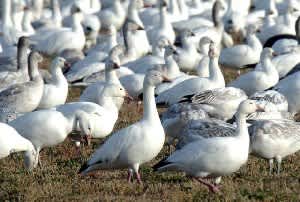Lamar Colorado Hosts Annual Goose Fest Feb. 23-26
OutdoorHub 02.09.12

Each morning in southeast Colorado at this time of year, tens of thousands of snow geese lift off local ponds and reservoirs in a pre-dawn ritual. The swirl of flapping wings and din of honking grows louder as the birds circle overhead and make their way to nearby grain fields. The snow goose migration is one of the grandest wildlife displays in the western United States and one of the many attractions that bring bird lovers to the High Plains Snow Goose Festival in Lamar.
“It still gives me goose bumps, pun intended, every time I see the birds take flight at sunrise,” said festival organizer Linda Groat of Colorado Parks and Wildlife. “The sights and sounds of thousands of white geese with black wing tips is a truly amazing spectacle.”
This year’s festival, Feb. 23-26, marks the 10th anniversary of the event that is cosponsored by Colorado Parks and Wildlife and the City of Lamar.
Snow geese are considered the most abundant goose in the world. Tens of thousands of the large, white birds move through eastern Colorado during their spring migration. Besides the clamoring flocks of snow geese, wildlife watchers can glass the landscape for numerous other bird species, including many wintering bald eagles and other raptors.
Festival-goers will have a wide variety of indoor and outdoor activities to choose from, beginning with several special tours on Feb. 24. Besides geese, other festival attractions include guided nature walks, a craft fair, birds of prey demonstrations, lectures, art workshop, hunting seminars, opportunities to explore the region’s museums and historic sites and a banquet.
Participants who plan to attend the outdoor tours are urged to dress in layers. The weather in southeastern Colorado is difficult to predict at this time of year, so it is best to be prepared for all kinds of conditions.
“We can have sunny days in the mid-60’s or wet weather with some snow,” said John Koshak a watchable wildlife specialist for Colorado Parks and Wildlife. “It’s best to be prepared for everything. The temperatures can change dramatically on the sunrise tours.”
Koshak also suggest bringing a camera, binoculars and a bird identification book.
Participants can pre-register or see the complete schedule at www.highplainssnowgoose.com. To inquire about festival activities, call 719-336-4370.
Snow geese increasing in abundance
A few years ago, wildlife biologists estimated there were approximately 6 million lesser snow geese in North America divided into four distinct populations. Today that number is in question. Researchers with the U.S. Fish and Wildlife Service and Environment Canada believe their previous estimate was low.
Since 1999, liberal hunting regulations have encouraged hunters to harvest as many snow geese as possible to reduce impacts to the fragile arctic tundra where the birds spend the summer. A study released in late 2011 indicates that hunter harvest has not been successful in corralling the snow goose population, which continues to increase.
Writing in the journal Wildlife Monograph, a team of nine research biologists concludes the abundance of midcontinent snow geese has been seriously underestimated in the past, leading wildlife managers to overestimate the ability of hunters to control or reduce the population.
The lesser snow geese, the species that moves through eastern Colorado, are part of the West Central Flyway population that winter in southeastern Colorado, Kansas, New Mexico, the Texas panhandle and northern Mexico. In late spring, these birds form enormous flocks before they head back to their summer nesting grounds in the Canadian arctic.
Lesser snow geese come in two different color phases. In the white phase, the geese are as white as snow except for the black wing tips. In the second phase, called blue geese, the color is slate gray with a white head. Both have a dark “grinning patch” on the sides of their bill.
Mixed in the flocks of snow geese you may find some Ross’ geese, which look similar but are two-thirds the size of snow geese and do not have the grinning patch. Ross’ geese weigh about 4 pounds while snow geese weigh about 6 pounds.
In their arctic breeding grounds, snow geese graze on grass and sedges that grow on the tundra. While migrating through the prairies of North America they feed on leftover grain in agricultural fields
The overcrowding and overgrazing of nesting areas has lead to the spread of avian diseases and habitat destruction on their summer range.
Hunting snow geese
In an effort to manage the exploding population of snow geese, federal and state wildlife agencies issued a conservation order in 1999 authorizing a special late light goose season.
Colorado hunting regulations allow for unlimited take of snow geese east of I-25 from Feb. 13 thru April 30. The requirement to purchase a federal waterfowl hunting stamp has been waived and hunters are allowed to use unplugged shotguns and electronic calls.
This year’s late light goose season starts Feb. 13.
Snow goose hunters may use “unplugged” shotguns – guns capable of holding more than three shells – to aid in taking light geese during the special conservation order season. Hunters are reminded that unplugged shotguns are permitted during the Light Goose Conservation Order season only and may not be used for any other species or season dates.
Special conservation order hunting regulations remain in effect until April 30. Hunters who choose to remove plugs from their shotguns must replace them prior to next year’s fall hunting seasons.
Hunters interested in learning more, are invited to attend a waterfowl-hunting seminar Sat., Feb. 25, 1 to 4 p.m. at the Colorado Parks and Wildlife Office at 2500 S. Main St. in Lamar. For more information, call 719-336-6600.
For more information about the late light goose conservation season go to: http://wildlife.state.co.us/Hunting/Waterfowl/Pages/WaterfowlHome.aspx.

